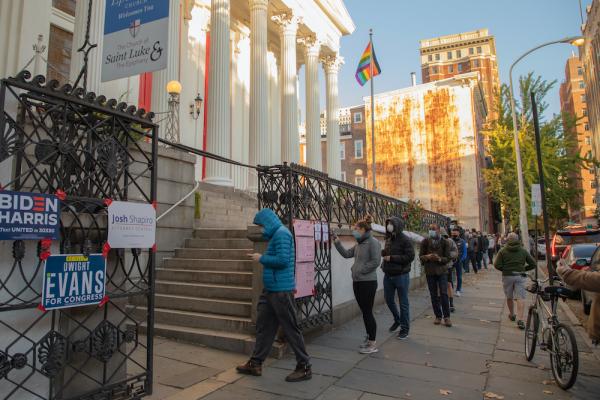Nearly 100 million Americans have already cast their ballots. It’s a staggering and hopeful number that makes this Election Day unlike any other. Today, the nation decides whether it will follow the path to a more inclusive, multiracial democracy — or spiral further into the violent abyss of white supremacy. Today we decide what kind of nation we want to become.
For many in this election season, both COVID-19 and rampant police violence have revealed the racist systems that have haunted this country since its founding. To uphold those systems, the people who most benefit from them are engaging in the most direct and deliberate efforts at voter suppression and intimidation we have seen since before the passage of the 1965 Voting Rights Act.
So across the country, people of faith are calling for vigilance to ensure a free, fair, and safe election. Chaplains are filling polling sites where conflict is possible, especially in battleground states, along with legal experts. Through efforts like Lawyers & Collars/Turnout Sunday and Souls to the Polls, faith communities are watching, waiting, caring, preparing, protecting, and standing ready to be peacemakers for as long as needed, following Jesus who calls peacemakers the children of God.
Vigilance means being attentive to whether votes are fully and fairly counted, which will determine in part whether this election will be judged as legitimate. Vigilance means demanding that all votes are counted, including all mail-in and absentee ballots. Vigilance means maintaining a calm and measured approach as those votes are counted and denouncing any reckless or premature victory declarations. And if pervasive and decisive voter suppression subverts the popular will, vigilance means we are prepared to engage in resistance and even civil disobedience to protect our democracy and exercise our Christian witness.
The way this country reacts to this election’s outcome will determine whether the “cold” civil war that Eddie S. Glaude Jr. has described, will become a “hot” one. How the faith community responds matters.
Fortunately, a recent survey found that 8 out of 10 Americans say it is important for religious leaders to de-escalate anger before it turns violent and should encourage peaceful protest. If violence arises, faith leaders must to help persuade people by example that nonviolent resistance strategies can be more effective for change. And faith communities will need to strategize with other partners from all sectors to launch massive nonviolent protests and strikes to shut down the country if the election is stolen and the results are illegitimate.
The best voter guide for people of faith comes directly from God’s greatest commandments that Jesus declared in Matthew 22:37-39.
[Jesus] said to him, "'You shall love the Lord your God with all your heart, and with all your soul, and with all your mind.' This is greatest and first commandment. And the second is like it: 'You shall love your neighbor as yourself.'
The Apostle Paul instructs us that perfect love casts out fear (1 John 4:18). This type of love for our neighbor, our country, and a more just and inclusive democratic future will compel us to further action. This is not a passive or anemic love. As Dr. Martin Luther King Jr. said, “Power without love is reckless and abusive, and love without power is sentimental and anemic. Power at its best is love implementing the demands of justice, and justice at its best is power correcting everything that stands against love.” Let us stand together against everything that stands against love.
If you haven’t done so already, please go vote and encourage everyone in your sphere of influence to go vote. Be calm but vigilant!
Sojourners has created the Truth and Action Round-up, a daily email with reliable, real-time information and opportunities for action in the post-election period. This short-term resource will provide timely and actionable updates on the situation, no matter how it unfolds.
Got something to say about what you're reading? We value your feedback!






